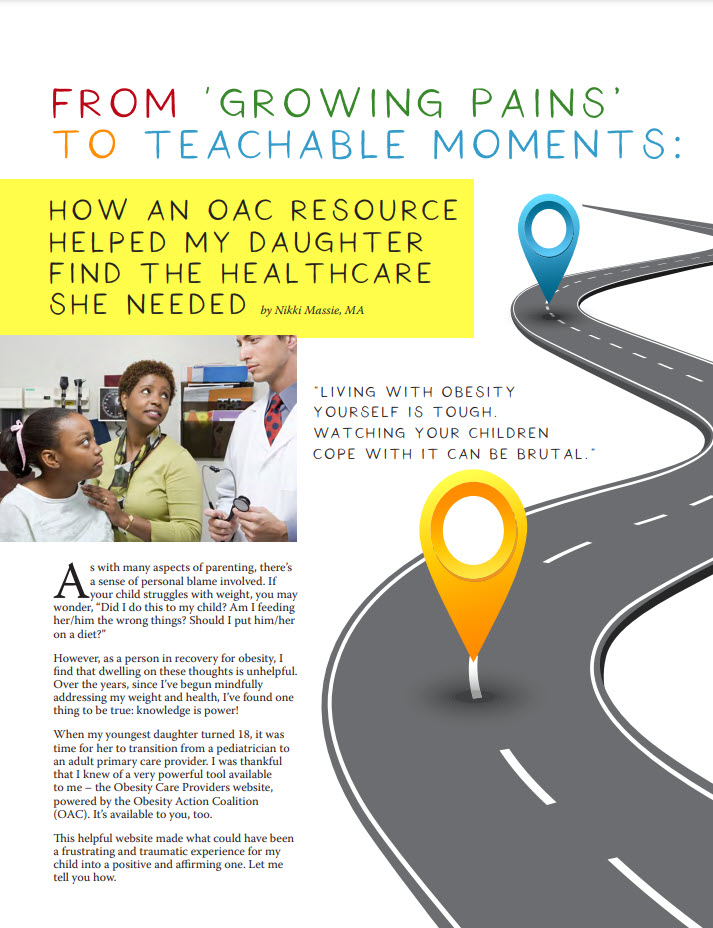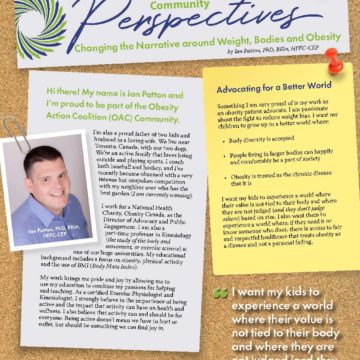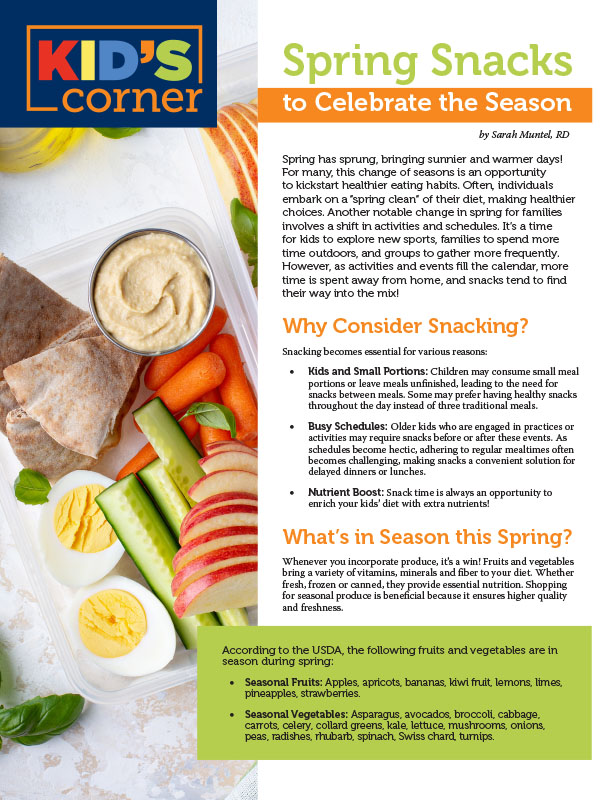From ‘Growing Pains’ to Teachable Moments: How an OAC Resource Helped My Daughter Find the Healthcare She Needed


by Nikki Massie, MA
“Living with obesity yourself is tough. Watching your children cope with it can be brutal.”
As with many aspects of parenting, there’s a sense of personal blame involved. If your child struggles with weight, you may wonder, “Did I do this to my child? Am I feeding her/him the wrong things? Should I put him/her on a diet?”
However, as a person in recovery for obesity, I find that dwelling on these thoughts is unhelpful. Over the years, since I’ve begun mindfully addressing my weight and health, I’ve found one thing to be true: knowledge is power!
When my youngest daughter turned 18, it was time for her to transition from a pediatrician to an adult primary care provider. I was thankful that I knew of a very powerful tool available to me – the Obesity Care Providers website, powered by the Obesity Action Coalition (OAC). It’s available to you, too.
This helpful website made what could have been a frustrating and traumatic experience for my child into a positive and affirming one. Let me tell you how.
Not a Kid Anymore
First, can we acknowledge that there is little to no guidance on how to transition young adults into the healthcare system? Seriously! I think the assumption is that many kids see family practitioners, but that wasn’t the case for us. My children went to a pediatrician who saw patients until they turned 21. We could have done this too – but after a while, it got awkward for my daughters to share waiting rooms decorated in cartoon characters, sitting alongside newborns and toddlers.
Therefore, when both my children turned 18, I offered to help them find their “grown-up” doctor. For my youngest, this happened pretty soon after she turned 18. She needed to address some symptoms that needed a closer look, such as migraines and sleep problems. She also has obesity.
My Daughter Needed Better Help
Looking back at my daughter’s pediatric care, our pediatrician was kind. However, he didn’t always understand how to connect with my daughter in a meaningful way about the subjects of health and weight.
He had good intentions, but when he brought the subject of her weight up, the conversation usually ended with him sharing how he lost weight as a teenager by simply not eating half of what he was served. This was not helpful.
How the OAC Helped
However, I also have obesity, and I sought treatment for it in 2008 by having gastric bypass surgery. I’ve since been successful in maintaining my weight loss. Still, one of the best things that has happened to me along my journey to address my health has been discovering the OAC. Through the OAC, I found resources and tools to help me have conversations with doctors about weight and health. Then, in 2018, the OAC launched ObesityCareProviders.com – an online tool that lets you search for a variety of healthcare providers who have experience treating patients with obesity.
My daughter and I both agreed it was time to transition her to a different primary care physician. I was grateful to have this resource to help her find a doctor who could also have a meaningful conversation about her various health issues, including her weight.
The Search
The OAC’s Obesity Care Providers website is simple to use. You can enter your zip code and find providers within a specific distance that you choose. You can also choose between different kinds of providers, such as primary care physicians, nurse practitioners, specialists, dietitians, bariatric surgeons and more.
Once you filter your search, the website returns a list of providers in your area. After talking to my daughter, we decided that we would like a female doctor whose office is close to our home. The provider profile for each practitioner on the website gives us that information, and we were able to find a doctor who seemed to be a good fit.
Weight DOES NOT Determine Our Value
This was also the time where I felt it would be good to have a conversation with my daughter about her personal goals. Weight is just one detail about us. It is something that affects our health, but it does not determine our value as people. I didn’t want her to think that her weight was associated with her capabilities or chances of success. I also wanted her to understand, before we embarked on any journey related to her health, that it is all about what SHE wants for herself and her life. I wanted her to know that I’m here to support her in whatever she decides as a young adult.
I think that conversation set her mind at ease. She knew I was on her team and that she can make her own choices. As a newly minted adult, my support was important to her. It’s important to me that she learns how to navigate these decisions. So, with that talk behind us, we went into her medical appointment feeling hopeful.
My Journey
I already told you how my daughter’s conversations with her pediatrician around weight used to go, but it might be helpful to share how mine went throughout my life so you can understand our reaction to this doctor’s visit.
Throughout my young life, I always battled with my weight. As an adult, I had obesity. However, very few medical providers started a conversation with me about it. I was always the one to bring up the topic of weight, and the conversation usually resulted in a copy of the food pyramid and advice to exercise more. There was very little follow-up involved.
My Daughter’s Journey
I am SO happy to tell you that this is NOT how my daughter’s first adult doctor appointment went!
Since she’s an adult now, she chose to see the doctor without me in the room (which is fine – it’s her right – but I’d be lying if I said it didn’t make me a little sad!). As I sat in the waiting room for 25, 35, 45 minutes, I began to worry. What was going on back there? However, as soon as she emerged with a smile on her face, I could tell things went well.
As we headed out, she showed me her post-appointment document that outlined everything they had discussed. I discovered she was gone so long because the doctor listened to all of the symptoms she was having and discussed next steps with her. She had several orders for follow-up testing and one to get blood drawn.
The doctor did discuss her weight and its effects on her health, but from what I can tell, it wasn’t the first thing they discussed. Also, according to my daughter, they made a plan and set some targets for a follow-up in three months.
For example, she was given a target number of steps to work toward taking each day. She was also given some advice on ways she could change her eating to address not only her weight, but also some of the symptoms she was experiencing.
Everything she told me sounded very sensible. But more importantly, it felt very doable to her. Best of all, she felt empowered to start!
Knowledge is Power
I can’t say that enough. The more information you have, the better you can advocate for yourself in any situation – but especially for your health!
In order to have meaningful conversations about weight and health, both patients and medical providers have to be willing and knowledgeable. The OAC’s Obesity Care Providers website is a valuable resource when looking for providers who have experience and training in treating patients with obesity. This will increase your chances of having productive conversations and a collaborative relationship with your healthcare provider.
That’s exactly what happened for my daughter and I. She felt empowered, and I feel like she’s building a support team that will take her where she wants to go in life. At the end of the day, isn’t that really what any parent wants?
If you are in need of a healthcare provider that has experience and training working with people with obesity, you can access the OAC’s Obesity Care Provider Locator at ObesityCareProviders.com.
About the Author:
Nikki Massie, MA, is a member of the OAC National Board of Directors and Co-Chair of the Membership Committee. She lives and works in Baltimore, Maryland, where she loves to take OAC Action by strategically leaving recently-read copies of Weight Matters Magazine everywhere she can.
by Sarah Muntel, RD Spring 2024 Spring has sprung, bringing sunnier and warmer days! For many, this…
Read Articleby Kendall Griffey, OAC Communications Manager Spring 2024 We have officially kicked off Your Weight Matters Regional…
Read Articleby Robyn Pashby, PhD Winter 2024 “No one is ever going to date you if you don’t…
Read Article








